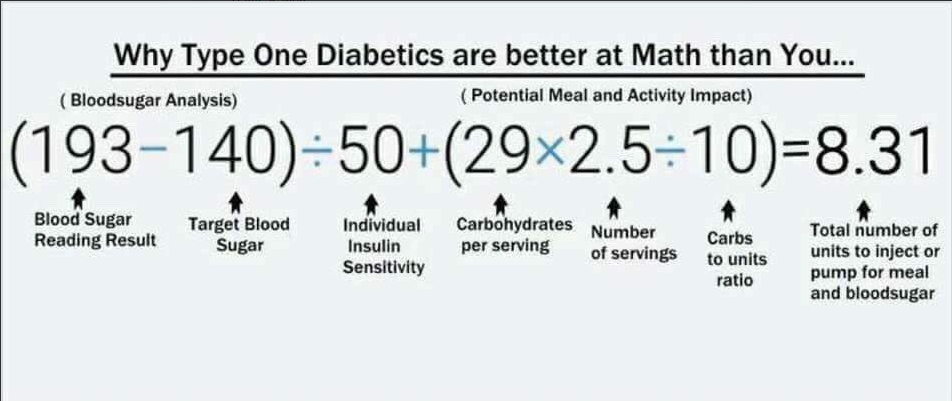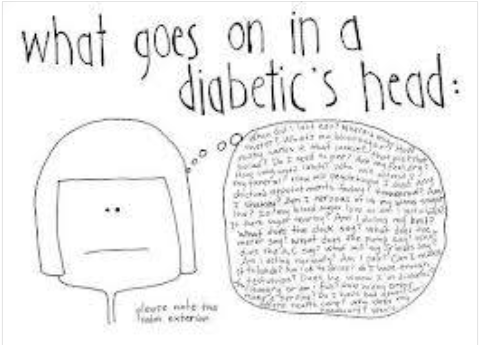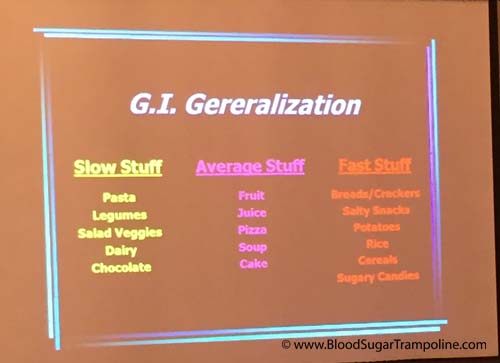For the last three years, I have used the first fourteen days in November, to give a little insight into my life with diabetes and try to dispel some of the myths around the public perception of diabetes on my Facebook and Twitter profiles with my friends, family and followers.
Why the first fourteen days in November?
I do it for only 14 days because I'm only human and just can’t do it for the whole month.
But I also bring it to a close on World Diabetes Day, which is November 14th, if you didn’t already know (because of my blasting it in your face;-D). The reason World Diabetes Day is November 14 is because that is the birthday of one of the creators of my miracle drug Insulin, Frederick Banting.
I make my posts are public so that anyone who is moved can share them and maybe extend diabetes awareness outside of my bubble.
By the way, the symbol for World Diabetes Day is the blue circle in the photo below.

So, in case you missed it, here’s what I posted for those fourteen days.
Day 1 of Diabetes Awareness
- Why do I bang on and on about diabetes awareness?
Because it could happen to you!
Diabetes can happen to anyone.
I don't want anyone to be diagnosed with diabetes but I also don't want you to die from a missed diagnosis.
I would like if all of my nearest and dearest would know 2 things and share it with their nearest and dearest:
- The risk factors for type 2 diabetes
Because many people don’t get diagnosed until they have developed a life altering diabetes complication that may have been prevented.
- The symptoms of type 1 diabetes are the 4 T’s (Tired, Thirsty, Toilet, Thin)
It may prevent someone from ending up in ICU or even save someone’s life. Mine was.
You can read a more detailed post on why exactly I choose those two topics and who I target here.
~~~~~~~~~~~~~~~~~~~~
Day 2 of Diabetes Awareness
- What is Diabetes?
Diabetes is when you have too much glucose in your blood because it can’t go where it’s suppose to.
- The food you eat is broken down into glucose or sometimes called sugar.
- The glucose is then absorbed into your blood.
- Then, it should move into each of your body's cells and become the energy we need to live.
- Insulin is the key to opening the door to those cells and allowing the glucose to enter.
In diabetes:
- If insulin doesn't work properly all the doors are locked or don’t always open when they should and the glucose is trapped in your blood.
- Type 1 diabetes your body doesn’t make insulin, so the doors are locked.
- Type 2 diabetes your body cannot properly use the insulin it produces and so the doors have faulty hinges.
- If your body can’t get energy from the glucose it looks to the fat stores for energy and when this happens in large amounts it produces a toxin/poison called Ketones.
- Too much ketones cause your organs to shut down.
There are more types of diabetes out there and you can find out more here.
~~~~~~~~~~~~~~~~~~~~~~
Day 3 of Diabetes Awareness
- Who can get diabetes?
Anyone!!! Any age! Any lifestyle!
The most common diabetes in childhood is type 1 but that does NOT mean adults don't get it too. In fact, 50% of all diagnosis of type 1 diabetes happen to people over the age of 30!!!
The most common diabetes in adults is type 2 but that doesn't mean that children don't get it too.
40% of people who are diagnosed with type 2 diabetes are fit and healthy.
Again please know the risk factors for type 2 and know the symptoms of type 1 diabetes.
~~~~~~~~~~~~~~~~~~~~~~~~~~~~~~~
Day 4 of Diabetes Awareness
- The diabetes jokes aren’t funny.
They’re insensitive and hurtful.
It’s not that we don’t have a sense of humour. We do! Seriously, We do!!!
We joke about pricks all the time... finger pricks.
We joke about getting high on Lucozade or Fanta.
Jokes about ""eating cake that gives you diabetes"" show that you have limited knowledge about diabetes.
So just don't repeat the joke.
~~~~~~~~~~~~~~~~~~~~~~~~~~~~~~~
Day 5 of Diabetes Awareness
- Did you know that; ALL types of diabetes are bad!
There is not a "good kind" or a "bad kind": all types of diabetes can make life unbearable and can kill you.
All types can cause diabetes complications.
Needles really are not the worst thing about diabetes.
~~~~~~~~~~~~~~~~~~~~~~~~~~~~~~~
Day 6 of Diabetes Awareness
- Did you know that; Managing diabetes is a lot harder than it looks or that some people would have you believe.
Taking care of my diabetes is a lot of work and it takes up a lot of space in my brain.
Balancing food, medication, activity, hormones, and all the other factors that influence glucose levels is not easy. I can only measure/control some of those factors some of the time which means no two days are going to be the same with diabetes.
And it makes me crazy when healthy foods have a crazy effect on my glucose levels!!!
It's enough to drive me to cake:-)

~~~~~~~~~~~~~~~~~~~~~~~~~~~~~~~~~
Day 7 of Diabetes Awareness
- Did you know that; There are NO stereotypes for diabetes.
Adults get type 1 diabetes, not just children.
In fact 50% of all the type 1 diabetes diagnosis are OVER the age of 30 years.
Young, fit and healthy people get type 2 diabetes. In fact, 30% of people who are diagnosed with type 2 diabetes do not fit the stereotype.
Know ALL the risk factors!
~~~~~~~~~~~~~~~~~~~~~~~~~~~~~~~~~
Day 8 of Diabetes Awareness
- Did you know that; Insulin has been available for almost 100 years and people STILL die from diabetes!
WHY?
- People with diabetes die because in some countries they can't afford their medication. #Insulin4All. In some countries, children with type 1 diabetes don't expect to become adults.
- They die because a diagnosis has been missed and thought to be the flu.
- They die because they haven't been taught to manage their condition at all and develop life threatening complications.
- They die from Dead in Bed syndrome.
- They die because they have been ill and developed life threatening DKA while ill.
Insulin is not a cure, it's a treatment that allows me to have a life. But it doesn’t beat having a working pancreas.
~~~~~~~~~~~~~~~~~~~~~~~~~~~~~~~~~
Day 9 of Diabetes Awareness
- Diabetes is not something that a person did to themselves.
There are a number of risk factors that play a bigger part than the lifestyle choices you make.
Yet, people with diabetes are made to feel that they are to blame. And that should not happen!
~~~~~~~~~~~~~~~~~~~~~~~~~~~~~~~~~
Day 10 of Diabetes Awareness
- If someone you know is diagnosed with diabetes, please offer them support not judgement.
Ask us what we need.
Don't lecture or nag. It’s not helpful.
Don't ask if our glucose numbers are good or bad. It is what it is.
Don’t focus on what we are not doing, instead see what we are.
Find more tips on how to support someone with diabetes here.
~~~~~~~~~~~~~~~~~~~~~~~~~~~~~~~~~
Day 11 of Diabetes Awareness
- Did you know that; Yes, You can live a normal life with diabetes BUT!!!!!
It requires extra planning and thought.
See image below. Nothing can be spontaneous!

Image source from a book called One Lump or Two - Haidee Soule Merritt is the artist ❤
~~~~~~~~~~~~~~~~~~~~~~~~~~~~~~~~~
Day 12 of Diabetes Awareness
- Did you know that; About ⅓ of all people with type 2 diabetes do not know they have it.
And that Type 2 diabetes often does not have any symptoms.
Find out here if you are at risk from this online assessment.

~~~~~~~~~~~~~~~~~~~~~~~~~~~~~~~~~
Day 13 of Diabetes Awareness
- A lot of times I eat sweets/candy because I have to.
Not because I want to, or would like to. And a lot of times I hate that I have to!
Sometimes I hate food because the math I have to do to eat is mentally exhausting!
Last night, my glucose levels dropped and I knew I would have to eat something sweet. It’s happening a lot lately and I’m still trying to adjust my medication to avoid it. But as a result I am so sick of glucose tabs, skittles, jelly beans and jellies.
It was long after dinner and I was full. I hoped for a delayed rise in glucose from dinner. It didn’t happen. I had to eat the jellies even though my stomach just wanted to spew them back out.

~~~~~~~~~~~~~~~~~~~~~~~~~~~~~~~~~
Day 14 of Diabetes Awareness - IT’S HERE!!!!
Happy birthday Fred!
Today, November 14 is World Diabetes Day. #WorldDiabetesDay.
I have been posting some diabetes information for the last 14 days to spread more awareness about the symptoms, risk factors and living life with diabetes.
And Today I celebrate;
- One of the men who is responsible for me being alive, Frederick Banting, whose birthday falls today.
- Being alive. I celebrate the advances there have been in diabetes technology and care, even since my diagnosis 24 years ago.
- And I remember why I will continue to advocate for better health services for all people with diabetes.
- In 2016 there were over 500 amputations related to diabetes complications. This is not acceptable and can be prevented with more podiatrists.
- 50% of all vision loss in Ireland is due to complications of diabetes and the same with kidney disease.
And now I take a nap until December:-)
















